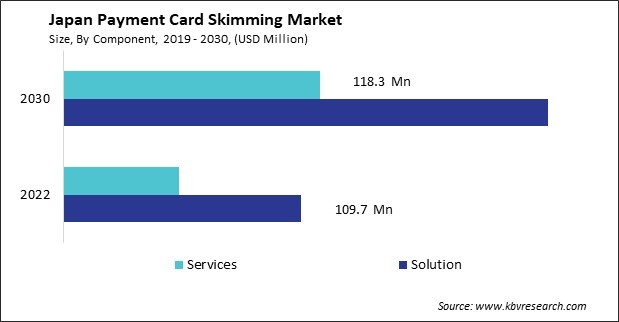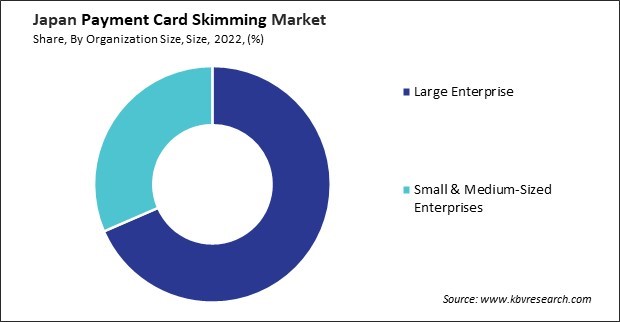The Japan Payment Card Skimming Market size is expected to reach $342.1 Million by 2030, rising at a market growth of 9.9% CAGR during the forecast period.
Japan's payment card skimming market has witnessed significant evolution and challenges over the years. One of the key factors driving the payment card skimming market in Japan is the increasing adoption of cashless payment methods. As Japan moves towards becoming a cashless society, with initiatives such as the government's push for electronic payments and the widespread use of contactless technology, the opportunities for card skimming have also expanded. Another significant factor contributing to the growth of the payment card skimming market in Japan is the sophistication of skimming devices and techniques. Criminals continuously develop more advanced skimmers that are harder to detect and remove.

Furthermore, the interconnected nature of the global financial system means that card skimming is not just a domestic issue in Japan but also has international implications. Organized crime syndicates and cybercriminal networks operate across borders, making it challenging for law enforcement agencies to combat card skimming effectively. Moreover, while technological advancements have improved security measures, they have also created new vulnerabilities. For example, the rise of mobile payment systems and digital wallets introduces new risks, as criminals target these platforms to steal payment card information or personal data.
The COVID-19 pandemic has also significantly impacted the payment card skimming market in Japan. The shift towards online and contactless payments due to social distancing measures has led to changes in the tactics employed by criminals. With fewer opportunities for physical skimming at ATMs and payment terminals, cybercriminals have increasingly turned to online scams and phishing attacks to steal card information. According to the International Trade Administration, in 2022, the cybersecurity products industry in Japan witnessed substantial growth, with an industry size of $3.6 billion, marking a notable 16% increase compared to the preceding year. The pandemic has highlighted the importance of cybersecurity and fraud prevention measures, as criminals exploit global crises for their illicit gains.
The proliferation of online shopping in Japan has brought a concerning rise in the payment card skimming market, posing significant risks to consumers and businesses. The rise of payment card skimming in Japan's online shopping industry underscores the urgent need for enhanced cybersecurity measures and greater awareness among consumers and businesses. Implementing robust encryption protocols, regularly updating security software, and implementing multi-factor authentication mechanisms help mitigate the risk of card skimming attacks.
One of the primary drivers behind the increasing prevalence of payment card skimming in Japan's online shopping ecosystem is the growing adoption of e-commerce platforms and digital payment methods. According to the International Trade Administration, there has been a consistent increase in the percentage of Japanese households engaging in online shopping, starting at 35.9% in 2018 and steadily rising to 47.8% in 2021. In December 2021, 56% of Japanese households shopped online. As more Japanese consumers turn to the internet to make purchases, criminals capitalize on the vulnerabilities inherent in online transactions to steal sensitive financial information.
Additionally, educating Japanese users about the importance of vigilance and safe online shopping practices, such as avoiding unsecured websites and scrutinizing transaction details for suspicious activity, helps minimize the likelihood of falling victim to card skimming scams. Therefore, addressing the surge in payment card skimming in Japan demands a concerted effort towards robust cybersecurity measures, consumer education, and vigilant online practices to safeguard individuals and businesses in the digital landscape.
The payment card skimming market in Japan is witnessing a surge in demand for solutions to prevent or detect fraudulent activities. One of the primary drivers behind the rising demand for anti-skimming solutions is the escalating frequency of cyberattacks targeting payment systems. Criminal organizations constantly devise sophisticated techniques to compromise POS terminals and ATMs, enabling them to capture cardholder data without detection.
In response to these challenges, companies operating in the payment card industry invest heavily in innovative technologies designed to thwart skimming attempts and protect cardholder information in Japan. Moreover, regulatory initiatives and industry standards play a crucial role in driving the adoption of anti-skimming solutions in Japan. Regulatory bodies are increasingly mandating stringent security requirements for financial institutions and merchants, compelling them to implement comprehensive measures to combat fraud and enhance consumer protection.
Furthermore, heightened awareness among Japanese consumers about the risks associated with payment card skimming is prompting businesses to prioritize security as a competitive differentiator. Customers are becoming more discerning about the safety of their financial transactions and are actively seeking out merchants who demonstrate a commitment to safeguarding their personal information. Hence, the surge in demand for anti-skimming solutions in Japan is driven by escalating cyberattacks, regulatory mandates, and consumer awareness, compelling businesses to prioritize security as a competitive advantage.

In Japan, the payment card skimming market poses a significant threat to consumers and businesses, prompting the need for robust cybersecurity solutions to combat fraud. One notable company in the payment card skimming market is NEC Corporation. As a global leader in information technology and cybersecurity solutions, NEC offers a range of products and services to safeguard payment card transactions and protect sensitive customer data. NEC's expertise in biometrics, encryption, and artificial intelligence enables it to develop advanced security solutions that help prevent unauthorized access to payment terminals and detect anomalies indicative of skimming devices. By leveraging NEC's technology, businesses in Japan enhance their defenses against card skimming and strengthen consumer confidence in electronic payments.
Another significant player in the Japanese payment card skimming market is Hitachi, Ltd. With a strong focus on innovation and technology, Hitachi develops cutting-edge solutions to address the evolving threat landscape of financial fraud. Hitachi's comprehensive approach to cybersecurity includes encryption technologies, fraud detection algorithms, and secure payment processing systems designed to protect against card skimming and other forms of payment fraud. By partnering with Hitachi, Japanese businesses implement robust security measures to mitigate the risk of data breaches and financial losses.
Additionally, Fujitsu Limited is a prominent player in the Japanese cybersecurity industry, offering a wide range of products and services to protect against card skimming and other cyber threats. Fujitsu's cybersecurity solutions leverage advanced analytics, machine learning, and behavioral biometrics to detect suspicious activities and prevent unauthorized access to payment systems. By integrating Fujitsu's security technologies into their infrastructure, businesses in Japan enhance their resilience against card skimming attacks and safeguard the integrity of their payment networks.
Furthermore, NTT Data Corporation is a leading provider of IT services and solutions in Japan, offering comprehensive cybersecurity offerings to protect against card skimming and other cyber threats. NTT Data's portfolio includes security consulting, threat intelligence, and incident response services aimed at helping businesses detect, mitigate, and recover from security breaches. By partnering with NTT Data, organizations in Japan strengthen their security posture and mitigate the risk of financial fraud associated with card skimming attacks.
Additionally, companies like Toshiba Corporation and Panasonic Corporation play significant roles in the Japanese payment card skimming market by providing secure hardware solutions for payment terminals and point-of-sale devices. These companies develop tamper-resistant designs, encryption technologies, and secure authentication mechanisms to prevent unauthorized access to cardholder data and protect against skimming attacks. By incorporating these security features into their products, Toshiba and Panasonic help ensure the integrity of electronic payment transactions in Japan.
By Component
By Organization Size
By Deployment Type
By Application
Our team of dedicated experts can provide you with attractive expansion opportunities for your business.

